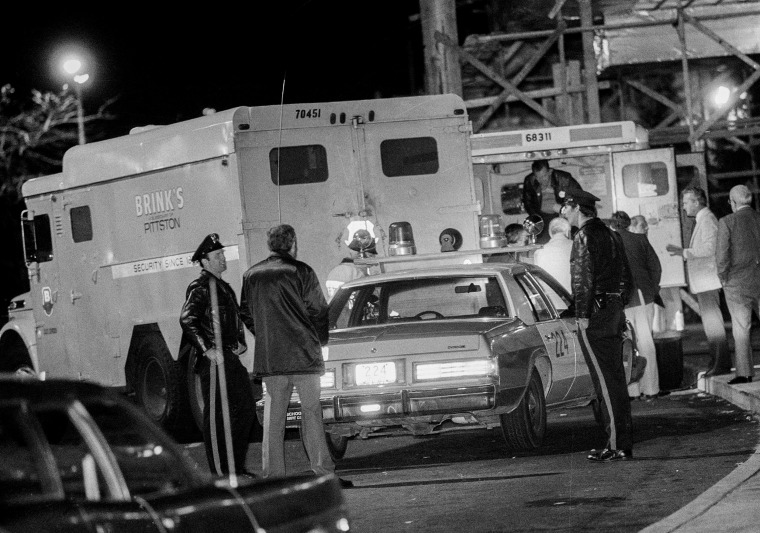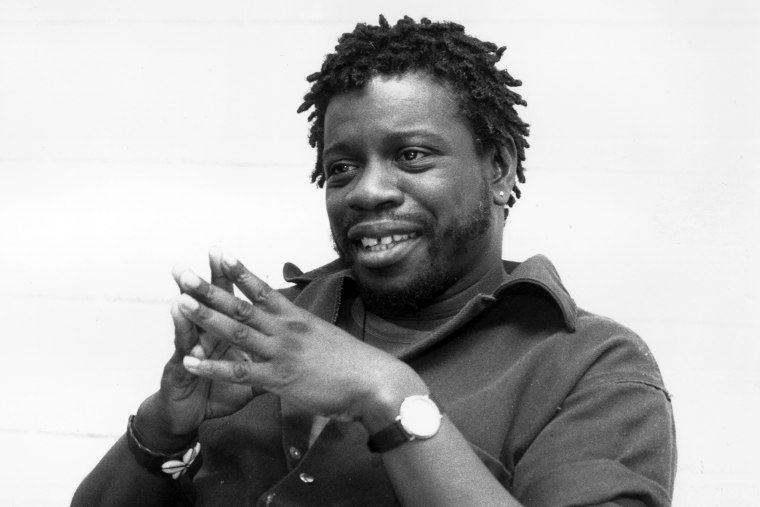After more than 35 years in prison, Mutulu Shakur, Tupac Shakur’s stepfather, will be released on parole on Dec. 16, when he'll spend what are expected to be his final days among family and friends.
The U.S. Parole Commission in October granted a request to release Shakur, an activist and holistic health care advocate, now 72, according to court documents obtained by NBC News. The decision to grant parole was made public on Thursday.
Shakur has several health issues, most notably stage-3 multiple myeloma, a blood cancer that can affect the bones and kidneys. He is being held at a federal medical center in Lexington, a prison in Kentucky for incarcerated people who require care.
“There are a lot of tears of joy,” Jomo Muhammad, an organizer with the Malcolm X Grassroots Movement, who has been working to free Shakur, said of the decision. “There’s still disbelief because we were steadying ourselves for another denial. Now folks are excited about being able to reunite Mutulu with his family. We were crying together. It’s a long time overdue.”
Shakur has been incarcerated for decades stemming from a 1988 conviction for leading a group of revolutionaries in a string of armed robberies in New York and Connecticut, including one that left three people dead. His supporters consider him to be a “political prisoner,” arguing that authorities wanted to make an example of him because of his activism.
Shakur has been denied release several times over the years, with authorities insisting that his crimes were too serious and his health had not deteriorated enough to warrant release. However, in the October decision, Commission officials told Shakur, "We now find your medical condition renders you so infirm of mind and body that you are no longer physically capable of committing any Federal, State, or local crime."
Organizers have advocated for Shakur's compassionate release, urging authorities to allow him to spend his final days with family, rather than in a Kentucky medical prison. Shakur has endured drastic weight loss due to his illnesses and treatments, has had Covid at least twice, and has relied on IV feeding tubes on and off since May, his attorney Brad Thomson said. Thomson said doctors with the Federal Bureau of Prisons gave Shakur in May less than six months to live, noting that his cancer treatment had stopped working.
After being released on parole, Shakur will be monitored for up to four months. Muhammad said he is glad that Shakur is still alive, and his supporters and family are working to secure the best medical care for him.
"He was not exonerated. He was given medical parole, which means he could still be snatched back from us," Muhammad said. "His release doesn't end his cancer. We're preparing for him to come home, and we have to figure out transportation because his condition has deteriorated so much that he can't fly commercial. He's been able to make it longer than what the doctors have given him, but he still has cancer and he's still dying."

Over the summer, the U.S. attorney for Manhattan, Damian Williams, denied a motion for compassionate release, citing the severity of Shakur's crimes. The decision came as a blow to organizers who were hopeful the motion would be approved. Thomson said he was worried that Shakur would not live long enough to be released so he could “die in dignity” surrounded by his loved ones.
“I’m very concerned that he might die any day and he might die before we have the opportunity for him to be heard on these issues either before the judge or before the parole commission,” Thomson said then. "They’re keeping him further incarcerated just as a form of punishment; just to exert control and pain over him. That’s especially cruel considering how desperate of a medical situation he’s in.”
Shakur was serving a 60-year sentence for conspiracy to violate the Racketeer Influenced and Corrupt Organizations Act, or RICO Act, bank robbery, armed bank robbery and bank robbery murder. He was also convicted of helping JoAnne Chesimard, aka Assata Shakur, escape from a New Jersey prison in 1979, according to The Associated Press and Thomson.
But advocates like Muhammad have said the government targeted Shakur all those years ago to quell his activism, and believe that at the time of his arrest in 1986, Shakur was doing his own independent investigation of COINTELPRO, an FBI campaign to discredit radical groups including Black liberation movements that were deemed illegal.
Now, Shakur's supporters and family feel the decision to release him represents a bittersweet victory.
“It's been astounding and beautiful to meet folks who knew Mutulu before his incarceration who continued to fight for him,” Muhammad said. “It'll be so beautiful when we see pictures of him reunited with his family.”

